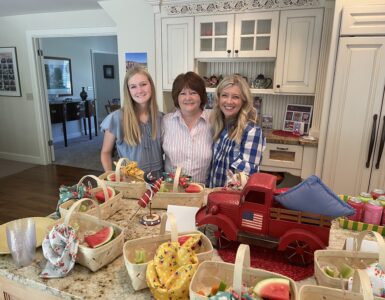The first stages of an empty nest can be jarring.
A home that was once bustling and full is now silent. Amidst the silence, you can almost hear the familiar noises of times past—the doors opening and closing, laughter down the hallway. It might sound like an abandoned haunted house, especially this time of year, but really, it’s the reality for empty nesters.
Studio 5 Relationship Contributor Dr. Matt Townsend shared how to breathe life back into your empty home so that you and your house can feel full again.
Matt acknowledged the lack of noise and people, which can make the house feel “haunted,” “You’re just left there with this mouth-breathing monster you haven’t talked to for years,” Matt joked.
The Emotional Impact
Empty nesters often experience what is called “empty nesting syndrome,” a lack of purpose and identity that can feel like a midlife crisis. This feeling tends to hit mothers more intensely. Matt suggested that if you loved having your kids around, you might want to start preparing for their departure earlier to make each release a powerful and empowering experience.
Staying Active and Vibrant
Before the kids left, there was always activity and movement. Once they’re gone, it’s easy to start “ghosting.” Matt advised, “We want to stay active, vibrant, living people and we’re going to have to learn another way to do that instead of the way we’ve always done it.”
Finding Light in the Darkness
Everything seems scarier when it’s darker. If all you focus on is the absence and loss, it can be overwhelming. Matt encouraged empty nesters to recognize the positive aspects. “The mere fact that they’ve left is a great sign that you’ve done your job. You’ve crushed it.”
Mourning and Moving Forward
It’s important to mourn the loss and embrace it. Journaling can be a helpful tool—write about the memories, the things you miss, and even the things you didn’t love. Being mindful about your feelings can help you reprioritize your life and move on.
Teaching the Graduate Level of Parenting
Parenting doesn’t end when the kids leave home. Matt suggested preparing to teach the “graduate level course of parenting.” There is still much to teach, such as how to age gracefully, maintain healthy relationships, and handle aging parents. He emphasized, “You can still incorporate the role of parenting, just parenting at the graduate level now.”
Flexing Your Mastery
Now is the time to flex the skills you’ve mastered as a parent. Think about what you loved and why you loved it and use those strengths to contribute to the broader community. Whether it’s tutoring, serving, or mentoring, there are many ways to use your gifts outside of your own family.
Adjusting and Modeling Resilience
Life is about adjusting, and this transition is an opportunity to model resilience for your children. Matt concluded, “If you don’t learn to adjust, why would your kids?”
For more insights from Dr. Matt, visit matttownsend.com, where you can access his programs and group coaching sessions.















Add comment